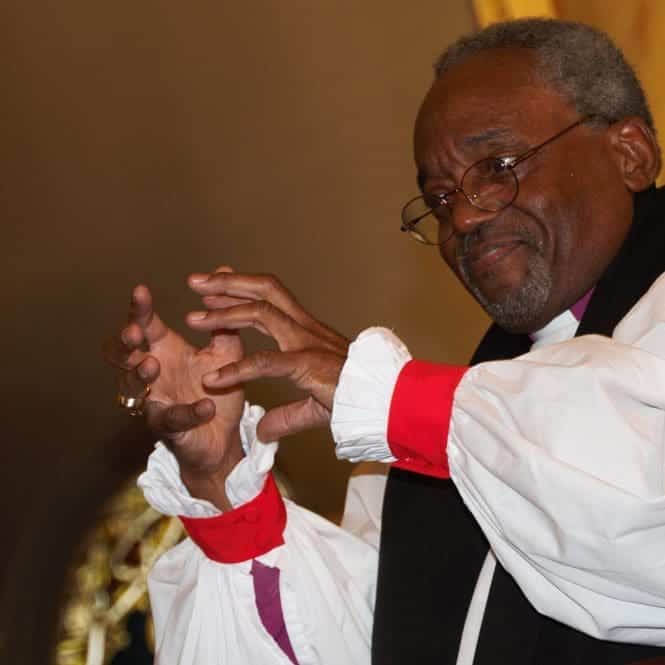I cannot adequately express the horror I feel for a man who can be so base as to veil his hypocrisy under the cloak of religion, and state the base falsehood he has done.
Just a few years ago, the big issue in the Episcopal church was the property recovery litigation. In that situation, many bishops diocesan, who would have otherwise sat there wringing their hands, suddenly acquired a backbone when ++Katherine laid down the law. And as part of the litigation, the national church was quick to assert the hierarchical nature of the denomination, both in court and in the media. “We have a trust interest in all assets,” the church proclaimed.
But while the church may be hierarchical when it comes to property, Todd Ousley and the other minions in the presiding bishop’s (PB) office take a far different approach when it comes to abuse. Specifically, if a bishop ignores the provisions of Title IV, or sandbags a complaint (imagine that!), Ousley et al respond to requests for assistance by saying, “This remains a diocesan matter.” We have seen this many times.
Ousley’s argument also is circular reasoning at its finest, for the reason abuse survivors seek out Ousley and the office of presiding bishop in the first place is that the diocese refuses to fulfill its obligations under canon law.
That approach, which doesn’t even rise to the level of pearl-clutching, has several effects:
- It undercuts the notion that the canons are mandatory. Once bishops realize they can ignore the canons with impunity, they quickly decide that compliance is inconvenient. As a result, we have numerous dioceses that can’t even be bothered to adopt the current safe church policies.
- It erodes trust in the church. If one takes the approach — which Anglican Watch does — that the canons are covenantal in nature and provide guidelines for the church’s common life, the whole edifice comes crashing down once we realize that the church doesn’t take its own end of the underlying covenant seriously.
- It send sends a powerful message to members about the church’s priorities. The church can and will spend millions to hold onto its property. But it won’t lift a finger if you’re abused and your bishop diocesan can’t be bothered. Thus, TEC considers property more important than people, which is the very antithesis of the Gospels. Jesus had scant use for the organization, but he had a profound love for those sidelined or marginalized by organized faith.
- It re-victimizes those hurt by the church. Far too often, we see that the church’s mishandling of abuse is more traumatic than the original offense. And in many cases, the damage is irreparable. The church can bloviate all it wants about the transformational power of liturgy, but if it’s so transformational, why is TEC imploding? And most survivors want less liturgy, more substance.
Relatedly, these situations underscore the fact that the church jumped the tracks somewhere in the 1970’s. Gone are the days when churchgoers fell for the whole, “Just trust us. We’re the church,” routine.
Or as one priest used to tell an Anglican Watch staffer of church financials (which he refused to give to vestry members), “Well, I see them.” Hardly reassuring, given ongoing ethical issues with that priest, and not acceptable to any concientious leader.
Nor are survivors going to be mollified by a bishop saying, “I’m sorry,” then going back to the same old. Cheap grace, the fuel on which TEC runs, went out of production in the 1950’s. So we’re more than a little over it.
Neither are we assuaged by Ousley’s claims that the presiding bishop does not have the power to tell bishops what to do. Whether it’s the infamous and ironically named Bishop Love, Jon Bruno, or Whayne Hougland, the office of the PB can and does assert itself when it feels inclined to do so, including issuing pastoral directives to bishops. (We note that the pastoral directives issued to Bruno forbidding the sale of the St. James the Great property were too little, too late. The time to stop a sale is not once the contract has been signed. The time to intervene is before the bishop starts getting bright ideas.)
Looking forward, our hope is that the task force looking at the Office of Pastoral Development/Todd Ousley will examine not just the profound dysfunction we saw in the Whayne Hougland imbroglio. Instead, we hope that it will examine the lasting harm the church causes when it enages in selective enforcement of the canons as against bishops, while further traumatizing victims of abuse in the church.
Lastly, we close with an observation, which is that indifferent bystanders, like Todd Ousley, are largely responsible for lynchings, bullying, and other horrific acts. While they may not be the direct perpetrators, they become accomplices when they turn a blind eye to misconduct. Thus, it takes a special kind of a-hole to ignore the suffering of others on the basis of, “This remains a diocesan matter.” Yes, that would be Todd Ousley.
Let us hope that Todd Ousley and Michael Curry eventually reap their just rewards for their disgraceful abuse of those most in need of the church’s love. After all, if it’s not about love, it’s not about God.


Leave a Reply